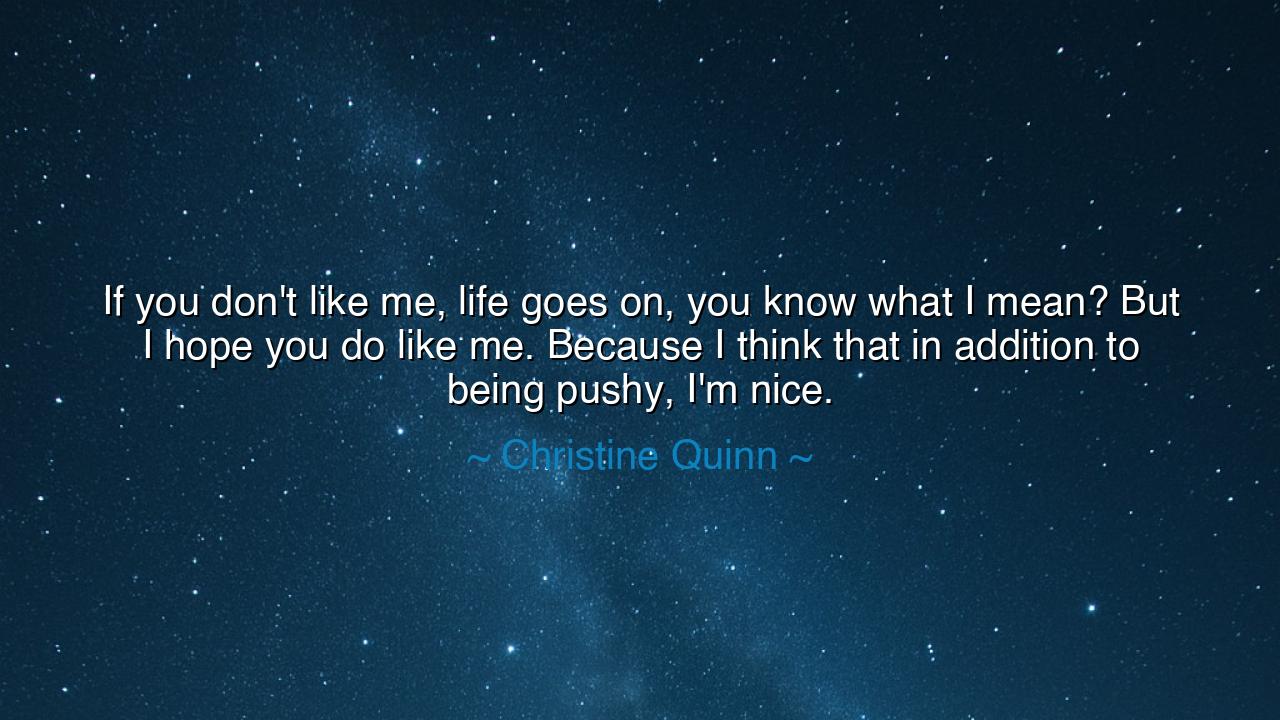
If you don't like me, life goes on, you know what I mean? But I
If you don't like me, life goes on, you know what I mean? But I hope you do like me. Because I think that in addition to being pushy, I'm nice.






“If you don't like me, life goes on, you know what I mean? But I hope you do like me. Because I think that in addition to being pushy, I'm nice.” — Christine Quinn
In these candid and disarmingly human words, Christine Quinn, the bold and unapologetic figure known for her charisma and command, reveals a truth that lies at the heart of all human striving — the delicate balance between authenticity and acceptance. When she says, “If you don’t like me, life goes on,” she speaks with the strength of one who refuses to be defined by others’ approval. Yet when she adds, “But I hope you do like me,” she acknowledges the tender humanity that lives beneath confidence — the simple truth that even the strongest hearts still long to be seen, understood, and loved. Her confession, both humorous and wise, is a mirror of the eternal struggle between individual power and human connection.
To understand the depth of these words, we must first see the woman behind them. Christine Quinn, known for her role in the world of luxury real estate and the glamour of television, has built her image on confidence, ambition, and fearlessness. Yet this quote shows another side — the self-aware and vulnerable side of ambition. She admits that she can be “pushy,” that she fights fiercely for her goals, yet she also insists, “I’m nice.” In this balance lies her wisdom: she does not deny her force, nor does she abandon her kindness. She reminds us that strength and compassion are not opposites but two pillars of character that, when joined, create the full measure of a person.
The ancients, too, wrestled with this tension. The Greek philosophers taught that the greatest virtue was temperance — the harmony of passion and reason, of fire and restraint. The Stoics counseled self-sufficiency, to live undisturbed by praise or blame; yet even they knew that man is a social being, woven into the web of others. To live without caring for others’ regard is not strength but isolation; to live dependent on their approval is not humility but slavery. What Quinn expresses, in her modern tongue, is this same ancient wisdom: the art of caring without being consumed, of hoping without needing, of walking one’s own path while still leaving room for love.
Consider the story of Eleanor Roosevelt, a woman once mocked for her appearance and dismissed for her gentleness, who became one of the most powerful voices for justice in the twentieth century. She was indeed “pushy” — demanding change, speaking truth to power — but she was also deeply kind, often visiting orphanages and hospitals in secret. She once said, “Do what you feel in your heart to be right, for you’ll be criticized anyway.” Her life, like Quinn’s words, reminds us that approval is fleeting, but integrity endures. A person who acts from authenticity — who dares to be both strong and kind — may not be loved by all, but will be respected by time.
Quinn’s declaration, “If you don’t like me, life goes on,” also speaks to the impermanence of judgment. The opinions of others, no matter how loud, fade like echoes. What remains is the truth of how we lived and what we gave. To attach our worth to others’ perceptions is to chase shadows; to live in truth is to walk in sunlight. Yet her humility — “But I hope you do like me” — reminds us that no soul is immune to the need for connection. We are all, in the end, bound by the desire to be loved, even as we learn to stand alone. This is not weakness — it is what makes us human.
Her acknowledgment of being “pushy” carries its own wisdom. In a world that often demands silence from those who dream boldly, pushiness becomes another name for persistence, for courage, for self-belief. The ancients would have called it fortitude — the strength to pursue one’s purpose even when misunderstood. To be pushy and kind is to live as both lion and dove: fierce enough to carve one’s destiny, gentle enough to care for others along the way. It is the essence of balanced strength, the mark of one who has learned that power without grace becomes tyranny, and grace without courage becomes fragility.
Lesson:
From Christine Quinn’s words, we are reminded that authenticity is the highest form of freedom. Be who you are, and let the world decide how it feels — for the world’s opinion is but a wave upon the ocean of your being. Yet, as you walk in truth, do not let your confidence harden into arrogance; let kindness be your companion, even when it goes unreturned. If some do not like you, life indeed goes on. But never let rejection silence your warmth or dull your fire. For the soul that is both strong and kind, ambitious yet loving, becomes a light unto others — fierce enough to lead, and humble enough to be loved.






AAdministratorAdministrator
Welcome, honored guests. Please leave a comment, we will respond soon